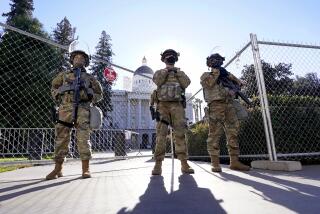Army to Probe Hirings in Gun Contract
- Share via
WASHINGTON — James R. Ambrose, undersecretary of the Army, has begun an investigation of Ford Aerospace & Communications Corp., the prime contractor for the Army’s controversial $4.5-billion Divad anti-aircraft gun.
The investigation centers on reports that the company has hired at least four retired military officers who had roles in the gun’s development, and that four other officers have been hired by Ford Aerospace’s Divad subcontractors, including the main one, Westinghouse Electric Corp.
Divad, which stands for Division Air Defense, is an elaborate weapons system that relies on radar to detect enemy aircraft in the dust of battle and aim its rapid-firing guns. It has had a succession of serious problems since the Army decided to build it in the mid-1970s.
Last year, Defense Secretary Caspar W. Weinberger set aside the scheduled purchase of the next 117 of the units--146 already have been bought--pending further tests this May.
Ford Aerospace won the contract after a competitive battle in 1980 with a General Dynamics Corp. design.
An investigation by the Washington Post has found that before the 1980 competition between the companies’ prototypes, Ford and two of its subcontractors had hired three former Army lieutenant generals, all of whom helped in preparing the proposal.
Before they retired from the Army, all three had been involved in the Divad research program, and one helped formulate the Army’s requirements for the system while he ran the Air Defense Command.
Another five lower-ranking Army officers who were involved in running the 1980 competition were later hired by Ford and Westinghouse. One, the Army test manager at the trial, was hired to be Ford’s chief test manager three months after the contract award.
“One has to be sensitive to perceptions,” Ambrose said in an interview.
Ambrose, who worked for Ford Aerospace for 25 years before he came to government, said he initiated the inquiry because such hirings “put a cloud on government operations,” which are carried on “in a goldfish bowl.”
The Divad hirings are part of a familiar problem for the military and military contractors--the so-called “revolving door.”
Even critics acknowledge that former military and civilian defense employees have important expertise for companies seeking to do defense business. The question is whether the companies, in hiring such persons, are buying not only expertise, but influence as well.
There is no evidence of any such exercise of undue influence in the Divad case. But it is nevertheless a major example of an intensifying problem for the Pentagon.
Defense research and procurement expenditures have risen sharply over the last five years. So has pressure in the military services for many officers to retire--and the revolving door today is spinning faster than at almost any time in the past.
The latest reports on file at the Pentagon show about 2,200 retired officers working for companies with $10 million or more apiece in Pentagon business.
Federal conflict-of-interest law does not bar such work.
More to Read
Inside the business of entertainment
The Wide Shot brings you news, analysis and insights on everything from streaming wars to production — and what it all means for the future.
You may occasionally receive promotional content from the Los Angeles Times.








